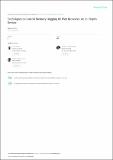| dc.contributor.author | Kamau Harun, McOyowo Sylivester | |
| dc.date.accessioned | 2022-01-25T11:06:58Z | |
| dc.date.available | 2022-01-25T11:06:58Z | |
| dc.date.issued | 2018 | |
| dc.identifier.issn | :-2319–8656 | |
| dc.identifier.uri | https://repository.maseno.ac.ke/handle/123456789/4647 | |
| dc.description | International Journal of Computer Applications Technology and Research.
https://www.researchgate.net/profile/Sylvester-Mcoyow | en_US |
| dc.description.abstract | The Web Browser is to date a popular piece of software in modern computing systems. They are the main interface for vast
information access from the Internet. Browsers technologies have advanced to a stage where they do more than before. They now parse
not only plaintext and Hypertext Markup Language (HTML), but also images, videos and other intricate protocols. These advancements
have increased demand for memory. This increased demand poses a challenge in multiprogramming environments. The contemporary
browser reference model does not have a memory control mechanism that can limit maximum memory a browser can use. This leads to
hogging of memory by contemporary browsers. This paper is a review on emergent techniques that have been used to control memory
hogging by browsers based on the contemporary reference architecture. We review major browsers architectures including Mozilla
Firefox, Google Chrome and Internet explorer. We give an in-depth study on techniques that have been adopted with a view to solve
this problem. From these reviews we derive the weaknesses of the contemporary browser architecture and inefficiency of each technique
used | en_US |
| dc.publisher | https:// www.ijcat.com | en_US |
| dc.subject | Browser reference architecture, memory hogging, web browser | en_US |
| dc.title | Techniques to Control Memory Hogging by Web browsers: An in-depth review | en_US |
| dc.type | Article | en_US |

